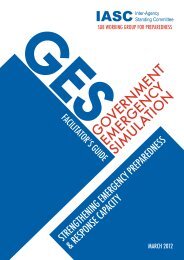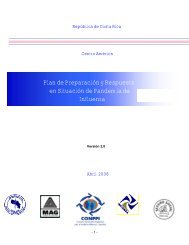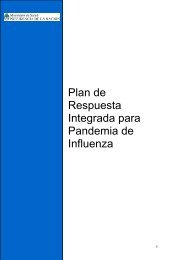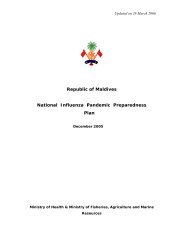- Page 2 and 3:
INFORMATION NOTICE The Canadian Pan
- Page 5 and 6:
Organization of Contents Preface Se
- Page 7 and 8:
Foreword and Acknowledgements The C
- Page 9 and 10:
Alternate Dr. Ross Findlater Chief
- Page 11 and 12:
Dr. Anne Roberts Department of Heal
- Page 13 and 14:
Past Surveillance Working Group Mem
- Page 15 and 16:
With special thanks to the : • Ad
- Page 18 and 19:
Preface Influenza A viruses periodi
- Page 20:
Section One INTRODUCTION
- Page 23 and 24:
ii The Canadian Pandemic Influenza
- Page 25 and 26:
Given that an influenza pandemic is
- Page 27 and 28:
The federal government, through Pub
- Page 30 and 31:
Table of Contents 1.0 Epidemiology
- Page 32 and 33:
Background 1.0 Epidemiology of Pand
- Page 34 and 35:
Based on past pandemics, when the p
- Page 36 and 37:
historical relationship between sic
- Page 38 and 39:
The Pandemic Influenza Committee wi
- Page 40 and 41:
4.0 Terminology On April 8, 2005, t
- Page 42 and 43:
4.1.2 Pandemic Alert Period Phase D
- Page 44 and 45:
4.1.5 Post-Pandemic Period A recove
- Page 46 and 47:
public of the risk from a pandemic,
- Page 48:
Section Three PREPAREDNESS
- Page 51 and 52:
2.6 Communications . . . . . . . .
- Page 53 and 54:
The changes are now resulting in em
- Page 55 and 56:
2.1.1 Current Status The national F
- Page 57 and 58:
2.2.1 Current Status The annual inf
- Page 59 and 60:
At the time of a pandemic, it is as
- Page 61 and 62:
The objectives of the antivirals in
- Page 63 and 64:
amantadine, which is not currently
- Page 65 and 66:
2.4.2 Planning Principles and Assum
- Page 67 and 68:
census, high intensive-care unit ce
- Page 69 and 70:
2.5.2 Planning Principles and Assum
- Page 71 and 72:
iii) Federal Federal communications
- Page 73:
Section Four RESPONSE
- Page 76 and 77:
ii The Canadian Pandemic Influenza
- Page 78 and 79:
Other unknown factors (e.g. age dis
- Page 80 and 81:
However if no other pandemic activi
- Page 82 and 83:
Canadian Phase 1.1 No new virus sub
- Page 84 and 85:
6.2 Pandemic Alert Period Canadian
- Page 86 and 87:
Canadian Phase 3.1 Sporadic human i
- Page 88 and 89:
Canadian Phase 3.1 Sporadic human i
- Page 90 and 91:
Canadian Phases 4.0 and 5.0 Cluster
- Page 92 and 93:
Canadian Phases 4.0 and 5.0 Cluster
- Page 94 and 95:
Canadian Phases 4.1 and 5.1 Sporadi
- Page 96 and 97:
Canadian Phases 4.2 and 5.2 Localiz
- Page 98 and 99:
6.3 Pandemic Period Canadian Phase
- Page 100 and 101:
Canadian Phase 6.0 Outside Canada,
- Page 102 and 103:
Canadian Phases 6.1 and 6.2 Pandemi
- Page 104 and 105:
Canadian Phases 6.1 and 6.2 Pandemi
- Page 106 and 107:
Component Focus Actions Response Le
- Page 108:
Table of Contents Annexes
- Page 111:
Annex A Planning Checklists Date of
- Page 114 and 115:
ii The Canadian Pandemic Influenza
- Page 116 and 117:
Consider how special studies, ident
- Page 118 and 119:
Purchase in bulk and stockpile extr
- Page 120 and 121:
Develop a list of essential communi
- Page 123 and 124:
B Pandemic Influenza Planning Consi
- Page 125 and 126:
Clear protocols for on-reserve FNs
- Page 127 and 128:
2. FNIHB Regions 2.1 Develop FNIHB
- Page 129 and 130:
5. Centre for Emergency Preparednes
- Page 132 and 133:
C Pandemic Influenza Laboratory Pre
- Page 134 and 135:
The Pandemic Influenza Laboratory P
- Page 136 and 137:
The NML currently performs testing
- Page 138 and 139:
and manipulation of viral cultures.
- Page 140 and 141:
3. Communication Information such a
- Page 142 and 143:
as appropriate, and the provision o
- Page 144 and 145:
3. Communication As in Phases 1.0 t
- Page 146 and 147:
8. Allow the swab to sit in place f
- Page 148 and 149:
Disease Surveillance Liaison Jeanne
- Page 150 and 151:
Annex D Recommendations for the Pri
- Page 152 and 153:
D Recommendations for the Prioritiz
- Page 154 and 155:
1. Priorities for Vaccination Prior
- Page 156 and 157:
Group 3: Persons at High Risk of Se
- Page 158:
Annex E Planning Recommendations fo
- Page 161 and 162:
ii The Canadian Pandemic Influenza
- Page 163 and 164:
3.0 Classes of Antiviral (Anti-Infl
- Page 165 and 166:
3.2 M2 Ion Channel Inhibitors (Cycl
- Page 167 and 168:
There are ethical obligations to pr
- Page 169 and 170:
) Neuraminidase inhibitors can be u
- Page 171 and 172:
At a national Influenza Research Pr
- Page 174 and 175:
F Infection Control and Occupationa
- Page 176 and 177:
helpful when transmission has enter
- Page 178 and 179:
Glossary of Terms Antiseptic hand r
- Page 180 and 181:
Infectious waste Influenza Intermed
- Page 182 and 183:
Statement.......
- Page 184 and 185:
Part C: Pandemic Influenza in Non-T
- Page 186 and 187:
1.1 World Health Organization Phase
- Page 188 and 189:
practices are the infection prevent
- Page 190 and 191:
3.0 Occupational Health and Infecti
- Page 192 and 193:
health care workers (see glossary f
- Page 194 and 195:
(b) (c) (ii) they have been immuniz
- Page 196 and 197:
(l) the importance of being immuniz
- Page 198 and 199:
5. Inform the public to avoid publi
- Page 200 and 201:
Part B. Management of Pandemic Infl
- Page 202 and 203:
(d) 3. Masks and eye protection, or
- Page 204 and 205:
Note: *Immune are those recovered f
- Page 206 and 207:
C. Infection Control Practices 1. U
- Page 208 and 209:
(e) Sterilization in Health Care 3
- Page 210 and 211:
3.0 Management of Pandemic Influenz
- Page 212 and 213:
(d) or using tissues; and the impor
- Page 214 and 215:
B. Management of Staff 1. Provide e
- Page 216 and 217:
to generate splashes or sprays of b
- Page 218 and 219:
(b) (c) washing. Antiseptic hand ri
- Page 220 and 221:
(f) Patient Care Equipment (Cleanin
- Page 222 and 223:
procedures is imperative to minimiz
- Page 224 and 225:
(b) Control of Pandemic Influenza 1
- Page 226 and 227:
3. Workers and their household memb
- Page 228 and 229:
Planning for Pandemic Influenza 1.
- Page 230 and 231:
Part C. Infection Control and Occup
- Page 232 and 233:
supplies and soap and towel dispens
- Page 234 and 235:
c. Gowns vii. Single-use disposable
- Page 236 and 237:
d. Laundry (linen) i. When reusable
- Page 238 and 239:
C. Infection Control Practices To p
- Page 240 and 241:
3. Environmental Control (Housekeep
- Page 242 and 243:
3.2 Control of Pandemic Influenza A
- Page 244 and 245:
v. before preparing, handling, serv
- Page 246 and 247:
c. Gowns i. Gowns are not required
- Page 248 and 249:
3. Disinfection a. Reuseable items
- Page 250 and 251:
(equipped with exhaust filter) rath
- Page 252 and 253:
. Collection and handling i. There
- Page 254 and 255:
3. Waste vi. All caregivers and lau
- Page 256 and 257:
Appendix I. Guideline Rating System
- Page 258 and 259:
Phase 4: Second or later waves of t
- Page 260 and 261:
B. Decontaminating Hands with an Al
- Page 262 and 263:
Appendix V. Tables Table A. Cleanin
- Page 264 and 265:
Reference List 1. Boyce JM, Pittet
- Page 266 and 267:
32. Duchini A, Hendry RM, Redfield
- Page 268 and 269:
67. Wade JJ, Desai N, Casewell MW.
- Page 270 and 271:
100. Orth B, Frei R, Itin PH, Rinal
- Page 272 and 273:
133. Korniewicz DM. Barrier protect
- Page 274:
Annex G Health Services: Clinical C
- Page 277 and 278:
Chapter 2. Patient Management I 2.1
- Page 279 and 280:
Chapter 6. Special circumstances 6.
- Page 281 and 282:
Pathogenesis of influenza The major
- Page 283 and 284:
dysfunction and less than 80 pg/mL
- Page 285 and 286:
influenza viruses supplant all othe
- Page 287 and 288:
maternal age 189 . Only four of the
- Page 289 and 290:
developed severe infections, one ch
- Page 291 and 292:
1.2.3 Cardiovascular Sudden death o
- Page 293 and 294:
High-risk conditions: (Co-morbidity
- Page 295 and 296:
Chapter 2. Patient Management I 2.1
- Page 297 and 298:
Legend: 1) Triage centres may be lo
- Page 299 and 300:
Initial influenza illness assessmen
- Page 301 and 302:
Microbiologic Diagnostic tests Micr
- Page 303 and 304:
2.2 Pediatric Triage This algorithm
- Page 305 and 306:
Initial influenza illness assessmen
- Page 307 and 308:
Secondary assessment (15% Platelets
- Page 309 and 310:
Clinical assessment for evidence of
- Page 311 and 312:
Appendix 2.I. Caring For Your Self
- Page 313 and 314:
B. Protect Yourself Against Influen
- Page 315 and 316:
C. Plan Ahead Spend a little time t
- Page 317 and 318:
Read the label to be sure that the
- Page 319 and 320:
D. When A Child Is Unwell Older chi
- Page 321 and 322:
Attachments A) How To Take A Child
- Page 323 and 324:
Squeeze and hold down the button fo
- Page 325 and 326:
C) Self-care Algorithms, Adults Sta
- Page 327 and 328:
Does Your Infant or Young Child (Bi
- Page 329 and 330:
Does Your Older Child (Age Six Year
- Page 331 and 332:
Appendix 2.II. Assessment Forms 1.
- Page 333 and 334:
Clinical features on history YES NO
- Page 335 and 336:
) Children ≤ 18 years: Identifica
- Page 337 and 338:
Symptoms (children 18 years) Date a
- Page 339 and 340:
Provisional Diagnosis Please Tick a
- Page 341 and 342:
Provisional Diagnosis Please Tick a
- Page 343 and 344:
Investigations Complementary labora
- Page 345 and 346:
If not admitted: Sent to: Home car
- Page 347 and 348:
measurements and minimize false ala
- Page 349 and 350:
2. Trans cutaneous PO2 monitoring
- Page 351 and 352:
3.2. Assessment and management of l
- Page 353 and 354:
3.2.2.1 Symptoms consistent with fl
- Page 355 and 356:
c) Specific therapy: Specific thera
- Page 357 and 358:
Appendix 3.I. Influenza-Like Illnes
- Page 359 and 360:
Chapter 5. Patient Management IV Ho
- Page 361 and 362:
5.3.3 General management Fluid the
- Page 363 and 364:
Appendix 5.I. Admission form 171 Id
- Page 365 and 366: Symptoms Date and time of onset of
- Page 367 and 368: Investigations (Not all tests will
- Page 369 and 370: Provisional Diagnosis Please tick a
- Page 371 and 372: Appendix 5.II. Rapid Virologic Diag
- Page 373 and 374: Appendix 5.III. Antiviral Drugs for
- Page 375 and 376: susceptible Staphylococcus aureus.
- Page 377 and 378: Table 5.7. Antimicrobials for the t
- Page 379 and 380: Chapter 6. Special circumstances 6.
- Page 381 and 382: 3. Education of all medical and non
- Page 383 and 384: Legend for Table 6.1.2 1) This algo
- Page 385 and 386: 6.1.5 Management of influenza patie
- Page 387 and 388: 6.2 Correctional and penal institut
- Page 389 and 390: Legend for Table 6.2.3 1. A special
- Page 391 and 392: ) General management: Specific aspe
- Page 393 and 394: 15. Barrett MJ, Hurwitz ES, Schonbe
- Page 395 and 396: 50. Duchini A, Viernes ME, Nyberg L
- Page 397 and 398: 85. Govaert TM, Dinant GJ, Aretz K,
- Page 399 and 400: 119. Kim HW, Brandt CD, Arrobio JO,
- Page 401 and 402: 152. NACI August 1, 2001, posting d
- Page 403 and 404: 182. Ruff RL, and Secrist D. 1982.
- Page 405 and 406: 217. Van Caeseele, Macaulay A, Orr
- Page 407: Annex H Resource Management Guideli
- Page 410 and 411: 3.2.4 Consider Insurance and Licens
- Page 412 and 413: 1.0 . . . . . . . . . . . . . . . .
- Page 414 and 415: 2.0 . . . . . . . . . . . . . . . .
- Page 418 and 419: addition, provinces and territories
- Page 420 and 421: 3.2 Human Resource Management Durin
- Page 422 and 423: technicians (laboratory, radiograph
- Page 424 and 425: Clerical skills in terms of patient
- Page 426 and 427: 3.2.5 Immunization of Health Care W
- Page 428 and 429: workers, as well as the public will
- Page 430 and 431: Appendix A Evaluation of Bed Capaci
- Page 432 and 433: Inventory of Beds (Work Sheet) Type
- Page 434 and 435: Emergency Ventilatory Capacity Cons
- Page 436: Annex I Guidelines for the Manageme
- Page 439 and 440: ii The Canadian Pandemic Influenza
- Page 441 and 442: Steps Requirements Limiting Factors
- Page 443 and 444: In order to deal with the increase
- Page 445 and 446: 1.6 Capacity of and Access to Vault
- Page 447 and 448: As a result of these special requir
- Page 449: Annex J Guidelines for Non-Traditio
- Page 452 and 453: Section 2: Human Resource Issues 2.
- Page 454 and 455: Section 1: Non-Traditional Sites 1.
- Page 456 and 457: timely distribution. The NESS shoul
- Page 458 and 459: most likely the local medical offic
- Page 460 and 461: 1.6.4 Assess Locations for Potentia
- Page 462 and 463: Security and Safety The safety of b
- Page 464 and 465: intravenous equipment (e.g., needle
- Page 466 and 467:
1.7.4 Coordinate Procurement of Sup
- Page 468 and 469:
2.2.1 Appoint a Human Resource Mana
- Page 470 and 471:
For each site the essential functio
- Page 472 and 473:
FUNCTIONS SKILL SETS/PERSONNEL F Mo
- Page 474 and 475:
2.2.5 Plan for Salaries or Payments
- Page 476 and 477:
c. Develop job descriptions and ski
- Page 478 and 479:
Based on the Checklist of Functions
- Page 480 and 481:
Malpractice/Liability Insurance of
- Page 482 and 483:
c. Volunteer screening Volunteers i
- Page 484 and 485:
Annex K Canadian Pandemic Influenza
- Page 486 and 487:
Interpandemic Phase - National Comm
- Page 488 and 489:
Health Canada Primary Communication
- Page 490 and 491:
Primary Communications Roles Primar
- Page 492 and 493:
Pandemic Alert Phase - National Goa
- Page 494 and 495:
Health Canada Primary Communication
- Page 496 and 497:
Primary Communications Roles Primar
- Page 498 and 499:
Primary Communications Roles Primar
- Page 500 and 501:
Primary Communications Roles Primar
- Page 503 and 504:
L Federal Emergency Preparedness an
- Page 505 and 506:
1. The Federal System Traditionally
- Page 507 and 508:
National Response Structure Nationa
- Page 509 and 510:
2. Public Health Agency of Canada a
- Page 511 and 512:
Public Health Agency of Canada, Hea
- Page 513 and 514:
Technical Response Group Structure:
- Page 516 and 517:
M Public Health Measures Table of C
- Page 518 and 519:
1.0 Introduction As an influenza pa
- Page 520 and 521:
Individuals who recover from illnes
- Page 522 and 523:
In March 2004, WHO hosted an intern
- Page 524 and 525:
5.1 Recommendations Encourage all
- Page 526 and 527:
As previously noted, antiviral trea
- Page 528 and 529:
Except when visiting a health care
- Page 530 and 531:
aseline data on these indicators sh
- Page 532 and 533:
Recommendations for Management of C
- Page 534 and 535:
Recommendations for Management of C
- Page 536 and 537:
Recommendations for Management of C
- Page 538 and 539:
The availability of antiviral drugs
- Page 540 and 541:
7.1 Strengthen recommendations to s
- Page 542 and 543:
7.3 Restrict indoor public gatherin
- Page 544 and 545:
7.5 Implement hand-sanitizing stati
- Page 546 and 547:
7.7 Other Measures NOT Recommended
- Page 548 and 549:
Increase awareness of the “travel
- Page 550 and 551:
initially at Customs, and within 4
- Page 552 and 553:
Contact management logistics Althou
- Page 554 and 555:
References 1. Department of Communi
- Page 556 and 557:
A.2 Community-Based Disease Control
- Page 559 and 560:
N Pandemic Influenza Surveillance G
- Page 561 and 562:
Introduction The overall goals of i
- Page 563 and 564:
Special Studies Protocols for speci
- Page 565 and 566:
Surveillance Objectives/Roles and R
- Page 567 and 568:
Pandemic Alert Period Table 2, belo
- Page 569 and 570:
Surveillance Objectives/Roles and R
- Page 571 and 572:
Canadian Pandemic Phase 4.1 Single
- Page 573 and 574:
Canadian Pandemic Phase 5.1 Single
- Page 575 and 576:
Canadian Pandemic Phase 3.1 Single
- Page 577 and 578:
Canadian Pandemic Phase 4.1 Single
- Page 579 and 580:
Canadian Pandemic Phase 6.1 Single
- Page 581 and 582:
Canadian Pandemic Phase 6.1 Single
- Page 583 and 584:
Table 4: Post-Pandemic Period Canad
- Page 585 and 586:
Study design Two types of surveys c
- Page 587 and 588:
Table 2 Sample size of each group (
- Page 589 and 590:
Household data How many total indiv
- Page 591 and 592:
Poultry and Other Animal Exposures
- Page 593 and 594:
Collected environmental swabs from
- Page 595 and 596:
Appendix 2: National FluWatch Influ
- Page 597:
Glossary of Terms and List of Acron
- Page 600 and 601:
Bed (Institutional Bed) Case weight
- Page 602 and 603:
Health Care Worker (HCW) without cl
- Page 604 and 605:
LICO (Low income cutoff point) LPN
- Page 606 and 607:
Pandemic Pandemic Alert Period Pand
- Page 608 and 609:
R Raw data Measurements and observa
- Page 610:
Vaccination Vaccine Virology Virus


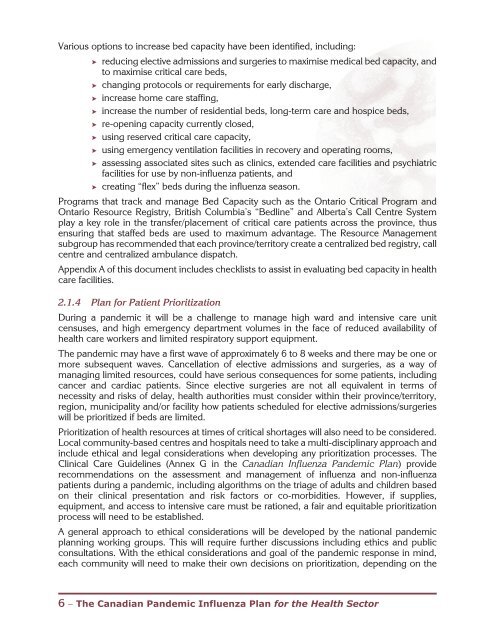
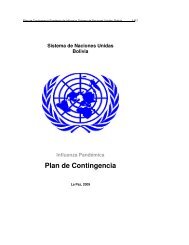
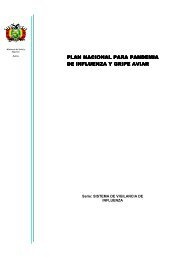
![Tanzania National Plan (January 2007)[1].pdf - Avian Influenza and ...](https://img.yumpu.com/36423433/1/190x245/tanzania-national-plan-january-20071pdf-avian-influenza-and-.jpg?quality=85)

